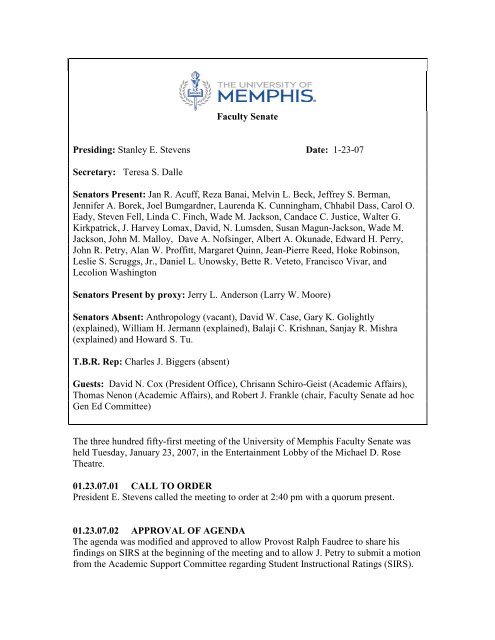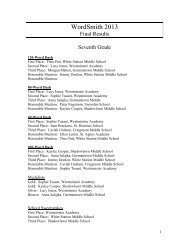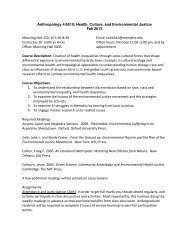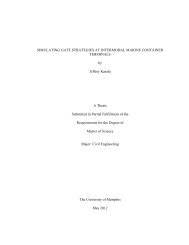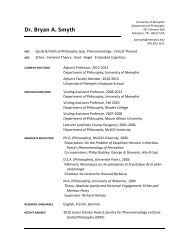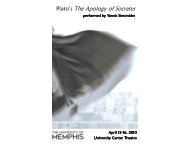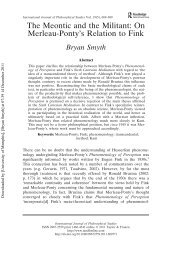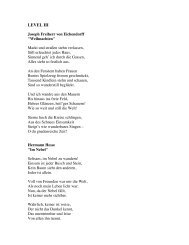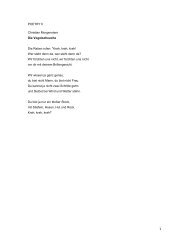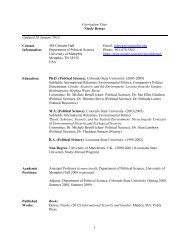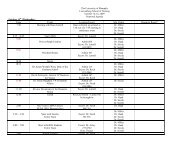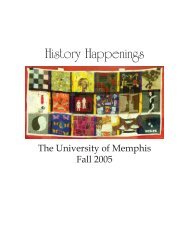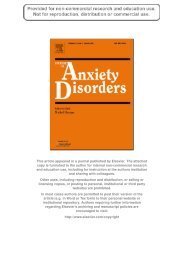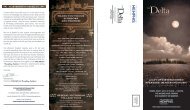Create successful ePaper yourself
Turn your PDF publications into a flip-book with our unique Google optimized e-Paper software.
Faculty Senate<br />
Presiding: Stanley E. Stevens Date: 1-23-07<br />
Secretary: Teresa S. Dalle<br />
Senators Present: Jan R. Acuff, Reza Banai, Melvin L. Beck, Jeffrey S. Berman,<br />
Jennifer A. Borek, Joel Bumgardner, Laurenda K. Cunningham, Chhabil Dass, Carol O.<br />
Eady, Steven Fell, Linda C. Finch, Wade M. Jackson, Candace C. Justice, Walter G.<br />
Kirkpatrick, J. Harvey Lomax, David, N. Lumsden, Susan Magun-Jackson, Wade M.<br />
Jackson, John M. Malloy, Dave A. N<strong>of</strong>singer, Albert A. Okunade, Edward H. Perry,<br />
John R. Petry, Alan W. Pr<strong>of</strong>fitt, Margaret Quinn, Jean-Pierre Reed, Hoke Robinson,<br />
Leslie S. Scruggs, Jr., Daniel L. Unowsky, Bette R. Veteto, Francisco Vivar, and<br />
Lecolion Washington<br />
Senators Present by proxy: Jerry L. Anderson (Larry W. Moore)<br />
Senators Absent: Anthropology (vacant), David W. Case, Gary K. Golightly<br />
(explained), William H. Jermann (explained), Balaji C. Krishnan, Sanjay R. Mishra<br />
(explained) and Howard S. Tu.<br />
T.B.R. Rep: Charles J. Biggers (absent)<br />
Guests: David N. Cox (President Office), Chrisann Schiro-Geist (Academic Affairs),<br />
Thomas Nenon (Academic Affairs), and Robert J. Frankle (chair, Faculty Senate ad hoc<br />
Gen Ed Committee)<br />
The three hundred fifty-first meeting <strong>of</strong> the <strong>University</strong> <strong>of</strong> <strong>Memphis</strong> Faculty Senate was<br />
held Tuesday, <strong>January</strong> 23, 2007, in the Entertainment Lobby <strong>of</strong> the Michael D. Rose<br />
Theatre.<br />
01.23.07.01 CALL TO ORDER<br />
President E. Stevens called the meeting to order at 2:40 pm with a quorum present.<br />
01.23.07.02 APPROVAL OF AGENDA<br />
The agenda was modified and approved to allow Provost Ralph Faudree to share his<br />
findings on SIRS at the beginning <strong>of</strong> the meeting and to allow J. Petry to submit a motion<br />
from the Academic Support Committee regarding Student Instructional Ratings (SIRS).
Motion:<br />
The members <strong>of</strong> the Academic Support Committee made a motion that the online<br />
administration <strong>of</strong> SIRS be resumed in the spring semester, 2007.<br />
The motion passed unanimously.<br />
01.23.07.03 GUEST SPEAKER - Provost Ralph Faudree<br />
Provost Faudree spoke to the Senate in support <strong>of</strong> the motion and reported on two<br />
concerns about using on-line SIRS (Student Instructional Ratings). He provided each<br />
Senator with a handout titled, SIRS (Summer 2006 and Fall 2006). He stated that while<br />
using paper SIRS, the university had a 60% return rate, but with the first use <strong>of</strong> on-line<br />
SIRS, the university reported only a 19.8% response. This fall, however, that was<br />
increased to 40.4%, a positive increase and more than had been anticipated. The second<br />
issue concerned scores decreasing with response level. Provost Faudree stated that this<br />
has not been proven to be true. Studies at other universities show no significant change,<br />
and two UoM studies did the same. In spring 2006 (paper implementation <strong>of</strong> SIRS) and<br />
summer 2006 (on-line implementation <strong>of</strong> SIRS), the <strong>University</strong> looked at 50 randomteacher<br />
courses taught by the same faculty and found that the mean difference <strong>of</strong> the<br />
average <strong>of</strong> all scores was 0%. Most were freshman and sophomore courses. The<br />
university looked at fall 2005 (paper implementation <strong>of</strong> SIRS) and fall 2006 (on-line<br />
implementation <strong>of</strong> SIRS) returns. Randomly chosen courses with the same faculty<br />
member showed the difference between scores on paper and on-line SIRS was .01% with<br />
scores actually higher on the on-line version. The standard deviation was .09, and the<br />
average score did not change. The good students tended to respond at a higher level.<br />
Provost Faudree stated that a committee on SIRS would revamp SIRS and have a<br />
different instrument by fall 2007. The new version would take into account different<br />
modes <strong>of</strong> instruction with some questions determined by the faculty member <strong>of</strong> the<br />
course. He suggested that the <strong>University</strong> could continue with on-line SIRS in spring<br />
2007 with a big revamping in the fall. There was a concern expressed about small classes<br />
(small classes defined as 5 or fewer students enrolled) not being counted in the on-line,<br />
but Provost Faudree stated that the university will count all responses unless there is only<br />
one student. There was also a question <strong>of</strong> how SIRS would be used for tenure and<br />
promotion during the transitional period. Provost Faudree stated that each department<br />
had the right to decide how they viewed this. He again pointed out that the move from<br />
20% to 40% response was a rapid movement and that the movement would increase.<br />
Some ways <strong>of</strong> encouraging students to respond might be to allow students who respond<br />
to register a day earlier. Provost Faudree was asked if he would release the list <strong>of</strong> courses<br />
that were part <strong>of</strong> the study to prove that there were no differences in on-line and paper.<br />
He responded that he would. There was also concern about the difference between<br />
totally on-line (web courses) and on-site classes since many current questions on SIRS<br />
are not applicable to web courses. Faudree again stated that the objective was to come<br />
back with an instrument for lecture courses and a different one for on-line and for clinical<br />
courses and other types, not just one instrument. Provost Faudree was also asked if there<br />
is a place where faculty could list things that worked to get response. He stated that there<br />
was a website where that could be posted. The Provost concluded his presentation with a<br />
brief questions and answers session.
President E. Stevens stated that if there were any other reports from the Senate they<br />
would be addressed later in the meeting.<br />
01.23.07.04 APPROVAL OF MINUTES<br />
The minutes <strong>of</strong> November 28, 2006, were approved.<br />
01.23.07.05 PRESIDENT’S REPORT<br />
1. President E. Stevens announced that three Senators were not returning for the<br />
spring 2007 session. Those Senators are Leonard Lawlor, Daniel Swan, and<br />
Robert Frankle. President E. Stevens then introduced the new senators: Melvin<br />
Beck (Biology), Hoke Robinson (Philosophy), and Daniel Unowsky (History).<br />
2. President E. Stevens then reported on his meeting with the Provost. He stated that<br />
an ad-hoc committee on shared governance had been established. The Provost<br />
stated that he looked forward to working with the committee. Also, President E.<br />
Stevens notified Provost Faudree that the Senate had voted that all standing<br />
committees that now send reports to the Provost will also send them to the Senate;<br />
Provost Faudree agreed to this procedure.<br />
3. At his meeting with President Raines, President E. Stevens discussed the issue <strong>of</strong><br />
having standing committees, not just academic committees, report to the Faculty<br />
Senate. The President stated that she agreed to this. It was also mentioned that<br />
the Tennessee legislative reception would not be held any more since it is too<br />
costly. President E. Stevens announced that the Marcus Orr Faculty Senate<br />
Lectureship in Higher Education Committee had selected Dr. Alan Lightman as<br />
speaker this year; the event will be co-sponsored by <strong>Memphis</strong> Reads and others.<br />
President Stevens also stated that Dr. Paula Short, TBR Vice Chancellor<br />
Academic Affairs, would meet with the Faculty Senate at the next meeting. He<br />
discussed whom she might meet with while on campus, including faculty groups.<br />
The focus <strong>of</strong> her visit is to meet with the Senate. President Stevens wants to know<br />
what issues Senators wish Dr. Short to address (for example, TBR and the issue <strong>of</strong><br />
shared governance), and he invited the Senators to contact him. He reminded<br />
everyone that Dr. Short’s responsibilities include academic affairs and student<br />
affairs.<br />
4. President E. Stevens announced that First South Credit Union wanted to make a<br />
presentation to the Faculty Senate, but the Executive Board decided not to allow<br />
that since all vendors could then ask for meetings with the Senate.<br />
5. President E. Stevens stated that the Committee on Committees had a motion<br />
concerning membership on the revived ad hoc IT Committee.<br />
6. President E. Stevens announced that the ad hoc Senate Committee on Shared<br />
Governance is putting together documents but have not had a meeting. The<br />
committee will ask Dr. David Cox about how to proceed. Dr. Cox will make a<br />
presentation at a later date.
7. There were no other concerns brought up.<br />
01.23.07.06 SPECIAL REPORT<br />
L. Cunningham reported on the Web <strong>of</strong> Knowledge and other library resources, stating<br />
that the <strong>University</strong> now has unlimited access. In addition, the Music Department now has<br />
new databases including some streaming audio. In response to a question <strong>of</strong> how to<br />
access the databases, L. Cunningham suggested going through the library website and<br />
then to the database and not to go directly to any particular database website because you<br />
may be asked to pay. The library already pays fees for use. The databases held by the<br />
library are available to faculty, students and staff, that is, anyone with a UUID. In<br />
response to a question concerning access by RODP classes, L. Cunningham stated that<br />
she was not sure about this.<br />
01.23.07.07 REPORTS FROM FACULTY SENATE COMMITTEES<br />
President E. Stevens asked if there were any reports from the Senate Committees. Dr. R.<br />
Frankle reported that the ad hoc General Education Committee preferred to issue one<br />
report by the March 1 st deadline. Dr. R. Frankle continues to chair the committee despite<br />
having retired in December. There were no further reports.<br />
01.23.07.08 REPORTS OF FACULTY REPRESENTATIVES ON UNIVERSITY<br />
STANDING COMMITTEES<br />
President E. Stevens, chair <strong>of</strong> the ad hoc Committee on Library Allocations, asked the<br />
library for data on the allocations system and how it worked, including funds for books,<br />
electronic media, and other allocations. The committee will report as information comes<br />
in.<br />
President E. Stevens reported on Effort Certification. He stated that there were many<br />
problems with this and that the <strong>University</strong> <strong>of</strong> <strong>Memphis</strong> has legal responsibilities and<br />
could lose federal funding if the report is not done properly. There are some problems<br />
getting this done, but the process will get simpler.<br />
President E. Stevens reported on the Policy Review Board. One policy the committee is<br />
looking into is web advertising, especially with what types <strong>of</strong> advertising. President E.<br />
Stevens also suggested that everyone visit the McWherter Library, Library Commons<br />
area, which runs 24/7. Progress is being made on putting in an eating area.<br />
Concerning the <strong>University</strong> Undergraduate Council (UUC), W. Jackson has attended only<br />
one meeting since taking President. E. Stevens place. He reported that each college is<br />
dealing with the issue <strong>of</strong> general education.<br />
01.23.07.09 OLD BUSINESS<br />
1. J. Berman reported on a postponed motion from the Faculty Policies Committee<br />
on the grievance process. Earlier, the Faculty Policies Committee had made a<br />
recommendation that there be another type <strong>of</strong> grievance procedure. The<br />
Committee looked at how other universities deal with grievance and extracted<br />
from that information some principles about how a policy might work at this<br />
university.
Motion: There are four parts to the motion as indicated numerically.<br />
1. The Faculty Policies Committee recommends that the Faculty Senate<br />
establish a standing Faculty Grievance Committee whose purpose shall be<br />
to provide an avenue <strong>of</strong> appeal for faculty who feel mistreated in their<br />
relationship(s) with other faculty members or with administrators <strong>of</strong> the<br />
<strong>University</strong> <strong>of</strong> <strong>Memphis</strong>.<br />
2. The Faculty Grievance Committee shall provide counsel to faculty<br />
members bringing a grievance, decide to accept or reject submitted<br />
grievances, investigate grievances, mediate when called upon, and make<br />
recommendations to the president <strong>of</strong> the university.<br />
3. The Faculty Grievance Committee shall develop its own set <strong>of</strong> rules and<br />
procedures under which it will operate.<br />
4. The Faculty Grievance Committee shall consist <strong>of</strong> nine faculty<br />
members serving staggered terms and selected by the Faculty Senate.<br />
There was a motion that proposal #2 use the word advice rather than<br />
counsel. The motion on changing the word passed unanimously.<br />
Proposal #2 now reads as follows:<br />
The Faculty Grievance Committee shall provide advice to faculty<br />
members bringing a grievance, decide to accept or reject submitted<br />
grievances, investigate grievances, mediate when called upon, and make<br />
recommendations to the president <strong>of</strong> the university.<br />
In discussion <strong>of</strong> the issue, there was a question about the relationship <strong>of</strong><br />
the Faculty Grievance Committee to the <strong>University</strong>’s Faculty<br />
Ombudsperson. J. Berman said that the two were entirely separate. In<br />
response about the question <strong>of</strong> how the faculty member approaches a<br />
committee with a grievance, J. Berman stated that the procedure would be<br />
decided by the committee and that details were left to the committee itself.<br />
J. Berman felt that the Faculty Ombudsperson was part <strong>of</strong> the<br />
administrative structure. R. Frankle stated that there were some cases in<br />
which going through a Faculty Ombudsperson was inadequate. Some<br />
faculty believe that the Faculty Ombudsperson, selected by the Provost,<br />
represented the administration and its interests. Dr. D. Cox asked about the<br />
implications <strong>of</strong> moving recommendations directly to President Raines. It<br />
was stated that unless a certain type <strong>of</strong> problem exists, the grievance does<br />
not go through channels and is instead called conflict resolution. The<br />
faculty committee has only recommending power. Changes include what<br />
gets to be defined as grievance and the process that follows that before it<br />
goes before the President. It gives the faculty member a hearing. There<br />
was the question about whether the ombudsperson should stay in place<br />
and what the role <strong>of</strong> the ombudsperson is. R. Frankle said that an<br />
ombudsperson was not adequate in some situations and that many
universities had both. In e-mails sent to President E. Stevens, Dr. E. W.<br />
Brody, the current Faculty Ombudsperson, suggested adding a mandatory<br />
review to the existing process. It was noted that some faculty never get<br />
the grievance hearing, so this suggestion would not work.<br />
The motion passed in its four parts with one negative vote and one<br />
abstention.<br />
1. Charges<br />
CHARGE TITLE COMMITTEE STATUS<br />
Intellectual Intellectual Property Research Policies<br />
Continue<br />
Property Student Property Committee<br />
Green Power Green Power Switch Administrative Policies<br />
Committee<br />
New<br />
Grievance <strong>University</strong> Grievance Faculty Policies Committee New<br />
Process Process<br />
Shared<br />
Governance<br />
Shared Governance Faculty Policies Committee Continue<br />
SIRS On-Line SIRS Academic Support<br />
Committee<br />
New<br />
Academic Academic Integrity Academic Policies<br />
New<br />
Integrity<br />
Committee<br />
Standing Description <strong>of</strong> Committee All standing committees (6) Continue<br />
Charge Responsibilities<br />
3. Other<br />
01.23.07.10 NEW BUSINESS<br />
A. Okunade, chair <strong>of</strong> the Committee on Committees, brought the following motion to the<br />
floor: The Committee on Committee proposes to repopulate the IT committee for the<br />
<strong>University</strong> with four from the previous committee and two new willing to serve.<br />
MOTION: Move that the Faculty Senate approve the nomination <strong>of</strong> the following<br />
faculty members to serve on Faculty Senate ad hoc Information Technology (IT)<br />
Committee:<br />
One or three additional prospective members need to be identified and nominated (to<br />
maintain an odd number <strong>of</strong> members).<br />
Michael Gootzeit (Economics)<br />
Charles Camp (Civil Engineering)<br />
Rick Fisher (Journalism)
Previous members <strong>of</strong> the committee who have indicated an interest in and willingness to<br />
serve on the re-started committee are the following:<br />
Maurice Crouse (History) a non-Senator<br />
Clif Mims (Instruction and Curriculum Leadership) a non-Senator<br />
Michael O’Nele (Theatre and Dance) a non-Senator<br />
Thomas Stafford (MIS), a non-Senator<br />
Members <strong>of</strong> the present Senate or associates there<strong>of</strong>, who have indicated an interest in<br />
and willingness to serve on the re-started committee, are the following:<br />
Jeffrey Berman (Psychology) a Senator<br />
Charles Biggers (Biology) faculty representative to the TBR<br />
The motion to accept all names passed unanimously.<br />
01.23.07.11 ANNOUNCEMENT/EVENTS<br />
1. On February 20, 2007, Dr. Paula Short, Vice Chancellor (Academic Affairs) <strong>of</strong><br />
the TBR will visit the campus. The meeting will take place in the FIT Bldg. (The<br />
Zone)<br />
2. The Marcus Orr Faculty Senate Lectureship in Higher Education speaker is Dr.<br />
Alan Lightman, who will speak on February 26, 2007, at 7 pm, in the Rose<br />
Theatre. His topic is “The Physicist as Novelist: Similarities and differences on<br />
how scientists and artists view the world.”<br />
3. The Community Emergency Response Team (CERT) Training takes place on<br />
February 12-13, 2007. Contact Pr<strong>of</strong>. Joy Clay at 678-3359. Reservations are<br />
required. Register NLT by February 2.<br />
01.23.07.12 ADJOURN<br />
The meeting adjourned at 3:50 p.m.


